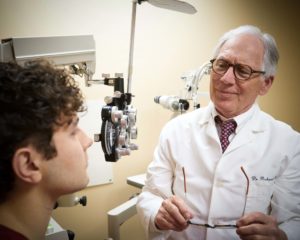Why and when should adults have routine eye exams? Dry Eye? Bifocals?

By Dr. Robert W. Ford, Chief of Optometry, Oak Orchard Health
Maybe you’ve never worn glasses or contacts, but your eyes do change as you get older. Forty seems to be a magic number when bifocals may be needed. And of course, cataracts are common as you get older. How can you prevent vision problems?
Can I prevent eye diseases?
Yes, starting with good overall health including nutrition and exercise. Eating a balanced diet helps your entire body including your eyes. Try to limit the amount of sugar and sweets you eat. People with diabetes are more likely to have eye disease and we typically see them once per year.
Do sunglasses help prevent cataracts?
Yes! If you spend a lot of time outdoors for work or fun, sunglasses help. And that goes for kids as well as adults. Remember to also wear eye protection for hazardous jobs and aggressive sports.
How do your eyes work?
Vision is a dynamic process involving both the eyes and the brain. The eyes receive light and images from the environment, and the brain then stores, analyzes, and interprets this data to give us vision.
The eyes must be healthy so that light entering the eyes through the pupils, comes to focus on the back surface of the inside of the eyes, the retina, where the data is sent to the brain, resulting in vision.
Eye doctors examine all the parts of the eye to make sure that the light has a clear path to the retina. The front window of the eye (the cornea) must be clear, the lens that sits behind the pupil must be clear, and the fluid between the lens and the retina must be clear. The light must form a clear image on the retina, so we have clear vision.
Eye doctors examine how well the light is focused on the retina. If you are nearsighted or farsighted or have astigmatism, they put lenses in front of your eyes that bring the light to focus on the retina. They perform tests to see if your two eyes are working together and to see if your eye muscles are moving the eyes correctly. These vision problems can be treated with glasses or, in many cases, contact lenses that float on the front of your cornea.
If not corrected, you may have blurred vision, eyestrain, and sometimes headaches. Uncorrected vision can also result in poor performance in the workplace depending on the job vision demands.
Will you need to have your pupils dilated during an eye exam?
Often this is needed. Why? Eye doctors look through your pupils to see into your eyes. They will often use dilating drops to make your pupils bigger so they can see more of the back of your eyes. It helps rule out any abnormalities such as diabetes, glaucoma, floaters, developing cataracts, and retina diseases. Pupils are dilated every 3 or 4 years when you are young and healthy, and at every eye exam as you get older.
Why do adults need reading glasses or bifocals in their forties?When you are young, the lens that sits behind your pupil focuses the light accurately onto the retina when looking at close objects or books. As you age, the flexible lens in your eyes gradually becomes hard and can no longer adjust to focus light that originates from close range. This condition is called Presbyopia. To treat Presbyopia, eye doctors prescribe glasses with bifocals, trifocals, or no-line multifocal. Some people who can see in the distance without glasses will still need reading glasses to see up close.
Why are my eyes so dry?
Complaints of dry eyes are very common, and the diagnoses can be very complicated. Tears are constantly being produced to protect the surface of the eyes, and the eyelids blink often to wash the excess tears into drains in the corners of your eyes. That is how it is supposed to work. For many reasons, the eyes get dry, and they may burn, itch, and get red. The lids may swell, and there may be deposits of mucus and debris in the corners of your eyes. Your vision can blur.
The causes of dry eyes may include, a dry environment, inflammation, certain medications, lid oil gland dysfunction, allergies, a history of cataracts or Lasix surgery, hormone changes, and lid abnormalities.
Your eye doctor may treat you with eye lubricants, hot compresses with lid massage, lid surgery, prescription medication, and more.
The bottom line is if you have dry eyes, see your eye doctor.
Glaucoma, the silent sight stealer
In the United States, approximately 120,000 are blind from glaucoma, accounting for 9% to 12% of all cases of blindness. Vision loss is caused by damage to the optic nerve. This nerve acts like an electric cable with over a million wires. It is responsible for carrying images from the eye to the brain. There is no cure for glaucoma—yet. The best way to protect your sight from glaucoma is to get a comprehensive eye examination. Then, if you have glaucoma, treatment can begin immediately.
There are many more eye conditions that need to be checked on a regular basis as you age. Be sure to get an eye exam yearly to avoid major problems. Give Oak Orchard Health a call for your next exam at (585) 637-3905.
